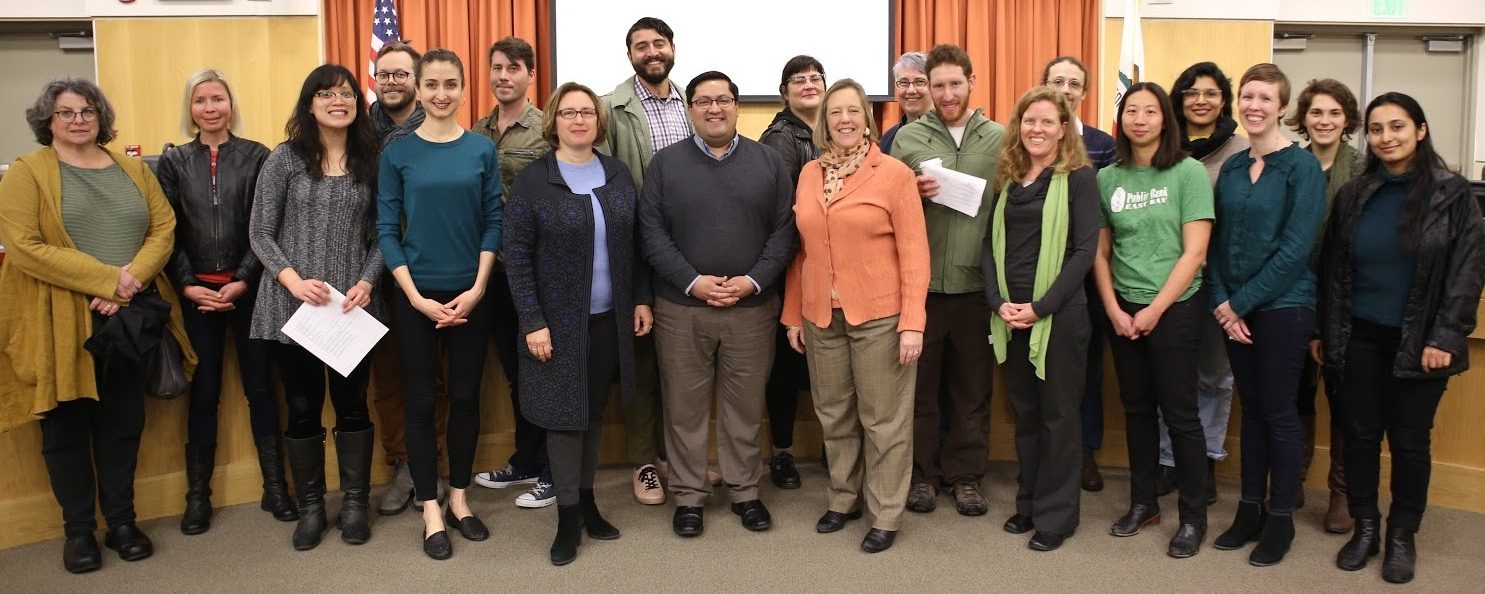Above Photo: Supporters wore the color green to signify how worker cooperatives put people and planet above profit. (Represented: Berkeley Mayor Jesse Arreguin, Councilmembers Kate Harrison and Sophie Hahn, and members of the Sustainable Economies Law Center, Project Equity, Network of Bay Area Cooperatives, Democracy at Work Institute, US Federation of Worker Cooperatives, and worker cooperative members and advocates.)
Berkeley, CA – Last month, Berkeley City Council unanimously adopted a set of recommendations provided by the Sustainable Economies Law Center (Law Center) and a coalition of worker coop members and advocates. In doing so, Berkeley became a national leader in supporting worker cooperative businesses.
“Berkeley is among the first US cities to earmark funding specifically to help local businesses convert to democratic worker ownership,” says Sara Stephens, Staff Attorney at the Law Center. “Berkeley is also the first city to commit to enacting a procurement incentive for worker cooperatives and tailoring its revolving loan fund to explicitly target worker cooperatives and businesses converting to cooperative ownership.” Council’s motion also committed the City to funding three years of technical assistance and support to local worker cooperatives and coop conversions.
This milestone comes in the third year of the Law Center’s partnership with Berkeley Mayor Jesse Arreguin, the City’s Office of Economic Development, and members of the Berkeley and larger Bay Area cooperative community. Spurred by a 2016 Resolution in Support of Worker Cooperative Development, much of the progress made since then has been behind the scenes, working closely with City staff to fit worker cooperatives into existing programs and economic development agendas.
Jordan Klein, Economic Development Manager for the City of Berkeley, has become a key champion for economic justice and inclusive economic development. “Worker cooperatives help to create high quality jobs, keep money flowing within our local community, sustain legacy businesses, and expand economic opportunity for everyone,” says Klein. “That’s why supporting and promoting worker cooperatives is a vital component of our office’s strategy to promote equitable economic development in Berkeley.”
Several dozen supporters attended the council meeting, many of whom shared personal stories of how worker coops have changed their lives and their communities for the better. Councilmember Ben Bartlett, whose district encompasses three worker cooperatives, summed it up well. “It’s important for workers to have a stake in their business, just as it is important for businesses to have a stake in their workers. Let’s do this.”
“Berkeley has set the bar for municipal support of worker cooperatives,” said Yassi Eskandari, Policy Director at the Law Center and organizer of the Berkeley policy campaign. “This is an exciting local win, and it could also be a turning point for the Bay Area as a region.”
Though the outcome of Council’s motion will depend heavily on effective implementation, the energy in the room — among community members, Council, and staff — is a good indicator that Berkeley is likely to follow through on its commitments.


